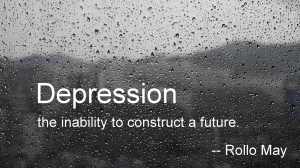When depression doesn’t respond to treatment, undiagnosed ADHD may be the culprit.
Kathy, a busy mother who cares for several special needs family members, was describing how completely her long-time battle with depression had resolved since starting treatment for ADHD.
“It’s amazing how good you feel when you can focus.”
The miracle of “paying attention” might not have occurred to people fortunate enough to focus since childhood, but Kathy revels in it. The ability to focus has changed her life and helped heal her depression for the first time in her memory.
Physicians who recognize depression often miss the signs of ADHD
 Physicians are thankfully much more aware of depression than a generation ago when I was in medical school, but many stubbornly resist the notion that ADHD sometimes underlies it. Treating a case of depression without diagnosing the ADHD behind it is like prescribing cough syrup without diagnosing the pneumonia that caused the cough. Untreated ADHD is often behind depression that is chronic or recurrent.
Physicians are thankfully much more aware of depression than a generation ago when I was in medical school, but many stubbornly resist the notion that ADHD sometimes underlies it. Treating a case of depression without diagnosing the ADHD behind it is like prescribing cough syrup without diagnosing the pneumonia that caused the cough. Untreated ADHD is often behind depression that is chronic or recurrent.
Many doctors are content to refill anti-depressant prescriptions month after month, and many therapists dissect and process feelings year after year despite the lack of measurable progress. While some cases of depression are chronic, most are not. Remission–not improvement–is the goal for depression therapy.
When regular life causes depression…
Life is busy and demanding. The burden of small daily tasks is remarkable. Schedules and lists impose a layer of order over the chaos, but chaos is a relentless adversary and must be battled daily.
On the other hand, life can be also be wildly unpredictable. We try to make it predictable with calendars and lists, but life can explode those plans in a second:
“Mom, how do you get fingernail polish out of the carpet?”
“Dad, why would your car just stop running and the “Oil” and “Temp” lights start flashing?”
“Could you drive me over to the mammography center so they can do a few more tests?
“Did you open that registered letter from the IRS?”
“Honey, the school is calling about James, and they want you over there now.”
 When we wake up in the morning, there are two confidences that make the difference between hope and despair. First, the confidence that we can manage the day we are expecting to have. Second, the confidence we can adjust when, not if, the day departs from our expectations.
When we wake up in the morning, there are two confidences that make the difference between hope and despair. First, the confidence that we can manage the day we are expecting to have. Second, the confidence we can adjust when, not if, the day departs from our expectations.
ADHD can steal both confidences, because it impairs the executive management systems that enable us to respond to life’s routines and its surprises. If you are not confident that you can succeed in what you know the day will bring, how are you not overwhelmed by the unexpected?
Patterns of depression in people with ADHD
It’s remarkable to me how many adults with ADHD have been diagnosed with depression in the past and have similar recall about the treatment:
“My doctor told me I was depressed, but that wasn’t the real issue.”
“I seem to get depressed when I’m bored and snap out of it when something new comes along.”
“I’ve been on antidepressants several times and felt a little better, but they weren’t addressing the actual problem.”
For people with ADHD and depression, ADHD might be the “real problem” and depression the “symptom”. Kathy let me use her real name in the hope that someone else would get unstuck from an unending cycle of boredom, discouragement and depression and feel the miracle of focus.


I have been meaning to comment before, but felt almost obligated after this post. I went through a lot of different anti-depressants before I “found” a therapist(was assigned one by the VA) that looked at the whole picture and diagnosed the inattentive ADHD that was the cause. Your blog has been incredibly helpful, not only in better understanding myself, but in being able to communicate with my family. Thank you so much!
LikeLike
Love, love, loved this post! So true!!! Rejoicing with Kathy!!!! 🙂 Gotta get the word out.
LikeLike
Presumably, treating depression without addressing underlying ADHD can have consequences similar to those of treating secondary anxiety while ignoring ADHD: https://attentionality.wordpress.com/2016/02/15/anxiety-surface-adhd-beneath/
For one thing, anxiety and depression often go hand-in-hand, so antidepressant treatment may rob the depressed person with ADHD of the anxiety that is her only source of drive. Are there other negative consequences (apart from ineffectiveness) of treating depression but not the underlying ADHD?
For example, if anxiety may be a makeshift source of drive, could depression serve as a crude means of inhibition? Could treatment of secondary depression, but not the underlying ADHD, therefore lead to greater impulsivity or otherwise worsen deficits of inhibition? I suppose that an analogy would be the way antidepressant treatment of bipolar disorder, in the absence of mood stabilizers, can lead to hypomania or mania.
LikeLike
John, it’s a great question, and I’m really not going to do justice to it with this short answer. Good job “mashing up” these two posts to compare.
In brief, I think that depression rates are high with ADHD for a very different reason. People with ADHD don’t cultivate depression for functional gain as we do anxiety. Rather, ADHD makes it hard to deal with the emotional precursors to depression. I don’t believe that depression “serves a purpose” for people with ADHD in the same way that anxiety does. It’s not been my experience that treating depression disinhibits ADHD. This might be because inhibition is partially modulated by serotonin, and most depression treatments raise serotonin levels. .
LikeLike
Thank you for your response; I think it’s helped me understand the role of anxiety better. I hadn’t been thinking of it as “cultivated,” but as something that came about more automatically.
LikeLike